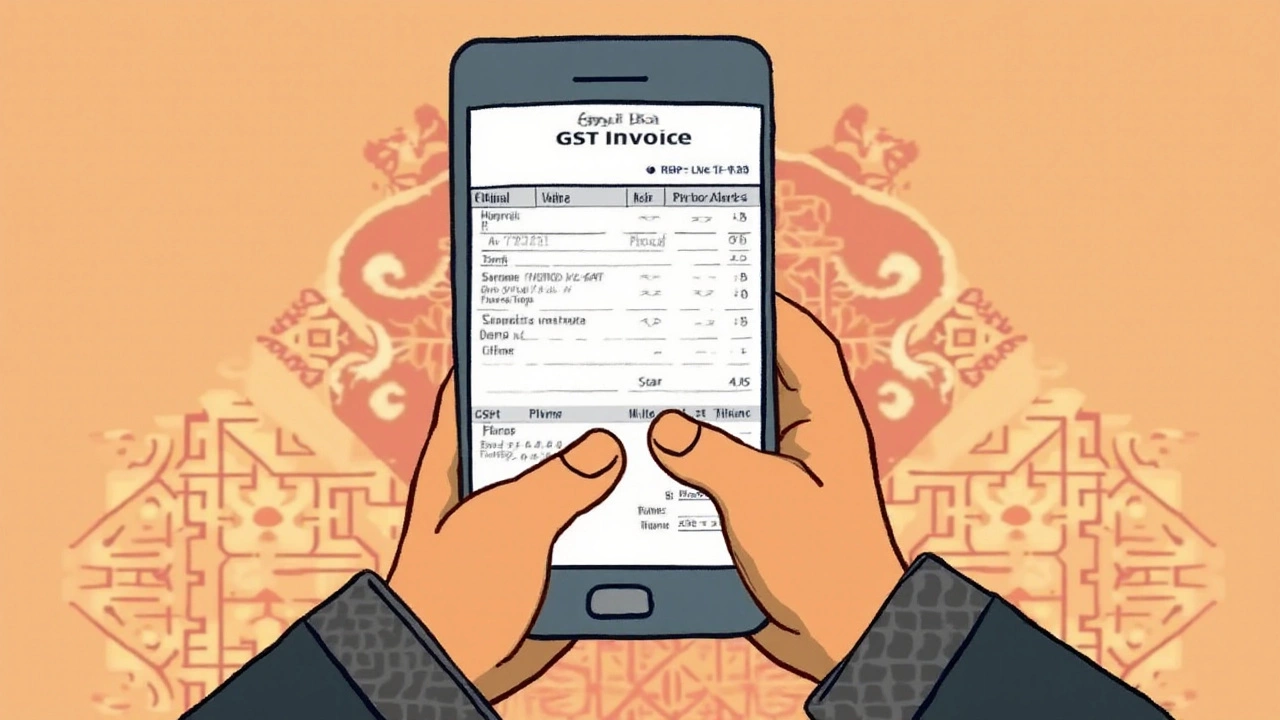The Goods and Services Tax (GST) has transformed the way businesses operate in India, streamlining the tax system into a cohesive structure. But one question often arises: is a GST bill mandatory? This question, simple as it seems, carries significant weight for any business engaged in selling goods or services.
At its core, a GST bill is more than just a receipt—it's an official document binding businesses to the tax regulations set by the authorities. Understanding its necessity requires businesses to explore the various legal and procedural underpinnings associated with GST registration and invoicing.
This article aims to shed light on these aspects, providing clarity to business owners about when they need to issue a GST bill, the implications of failing to do so, and the circumstances under which it might not be required. Ensuring compliance is not just about following the law but also about building trust with clients and maintaining smooth operations.
- The Role of GST Bills
- Legal Requirements for GST Bills
- Consequences of Non-Compliance
- When GST Bills May Not Be Required
The Role of GST Bills
The significance of GST bills in the Indian taxation system stretches beyond just being a mere piece of paper denoting a commercial transaction. Essentially, these bills are the cornerstone for ensuring transparency and accountability in the tax dealings between buyers and sellers. In the vibrant economy of India, where diverse businesses interlace with varied transactional practices, having a standardized GST bill system fosters a structured and coherent tax compliance environment.
By issuing a GST bill, a business is affirming its legitimacy and institutionalizing its practices in accordance with the tax statutes laid down by the Indian government. This leads to not only a lawful confirmation of the sale or service provided but also solidifies the mutual trust between the transacting parties. When you receive a GST bill, it's an assurance of a business's adherence to registered tax norms, and that it has remitted the correct amount of tax to the authorities. Thus, it's a key player in bridging the informational gap between transactions recorded on paper and those registered with governmental databases.
Moreover, GST bills are instrumental in seamless transaction processing, predominantly due to the Input Tax Credit (ITC) mechanism's reliance on these documents. Availing ITC means that businesses can reduce the tax paid on purchases from their sales tax liabilities, a process that hinges on the secure and accurate generation of GST bills. These bills thus serve as the proof required for claims, keeping a business's financial flows, particularly regarding tax credits, efficient and streamlined. Individuals may argue, as echoed by tax expert Ramnath Pramurty, who has observed the changing landscape, "Effective GST billing effectively reduces tax disputes and simplifies tax assessments."
By maintaining a consistent GST billing practice, businesses substantially cut down on the likelihood of audits and queries from tax officers, making it a pivotal aspect of modern financial strategies.
Let's delve into the different components that make up a GST bill. Typically, a standard GST invoice includes the invoice number, date, a clear description of goods or services, the quantity involved, applicable rates, discounts if any, tax charged, and crucially, the GST Identification Number (GSTIN) of the supplier. Each of these elements is there not just for regulation but to solidify the audit trail which can be retraced efficiently during assessments, both by businesses themselves and tax authorities. A GST bill hence plays a dual role: as a paper trail and a guarantee.
Beyond compliance, GST bills also serve as records that uphold consumer rights, empowering buyers with documented proof of their purchases which can be essential during disputes over goods or services. For instance, if a business fails to provide such documentation without valid cause, customers can report this, highlighting the bill's role as a protector of consumer interests. Hence, a GST bill is integral, not just from a fiscal point of view, but as part of the consumer-business equilibrium.

Legal Requirements for GST Bills
In India, the mandate to issue a GST bill is not just a matter of good business practice but a legal obligation under the Goods and Services Tax regime. This tax framework requires any business registered under GST and supplying goods or services to issue an invoice that complies with the statutory provisions. The requirement ensures transparency between the seller, buyer, and tax authorities, facilitating seamless auditing and reconciliation.
A GST **invoice** must contain specific details to be considered valid by law. These include the supplier's and recipient's GST Identification Numbers (GSTIN), a unique sequential invoice number, and the date of issue. Additionally, it should outline the description of goods or services provided, the quantity and value of goods, or the unit of measure where applicable. Importantly, details regarding the rate and amount of tax charged, classified into Integrated GST (IGST), State GST (SGST), or Central GST (CGST) must be clearly mentioned. The legislation demands this granularity to prevent any ambiguity regarding tax liabilities.
Another critical component of a GST bill is the harmonized system of nomenclature (HSN) code for goods or the service accounting code (SAC) for services. These codes are crucial as they aid in correctly identifying taxable items and ensuring uniform tax application across different states and regions. This classification is pivotal as it reduces disputes over tax classification, which could lead to litigation and penalties. David Arthur, a renowned tax consultant, highlights:
"Ensuring that all elements required in a GST invoice are meticulously followed can save businesses from the labyrinth of legal entanglements and financial penalties."
Under the GST regime, it's also essential for invoices to reflect the place of supply, an important element that helps determine whether a transaction is intra-state or inter-state. This distinction is significant for determining which type of GST applies. For example, intra-state supplies within a state require the application of SGST and CGST, whereas inter-state supplies attract IGST. To effectively manage these legal requirements, many businesses employ sophisticated invoicing software, which minimizes human error and streamlines compliance processes.
The consequences for failing to adhere to these legal requirements can be substantial. Businesses that do not issue a proper GST **bill** face heavy penalties, potentially including the loss of input tax credits, which can significantly increase operational costs. Thus, maintaining compliance not only helps avoid legal pitfalls but also supports smoother operations and financial stability. As the GST framework evolves, staying updated with any regulatory changes is crucial for organizations to continue meeting their legal obligations.

Consequences of Non-Compliance
When businesses in India overlook the requirements of issuing a GST bill, they’re not just sidestepping an administrative task; they’re veering into territory fraught with fiscal and operational risks. The Indian taxation system is quite clear on the mandate for GST bills as a means to maintain transparency and fairness in tax collection. Failure to comply can result in a cascade of consequences, starting with fines and penalties that can significantly impact a business’s financial health. It’s not rare for enterprises that ignore GST obligations to face penalties that begin at 10% of the tax due, with a minimum of INR 10,000, highlighting the government’s strict approach towards tax compliance.
Perhaps more damaging than monetary fines is the risk of legal action. When businesses consistently fail to issue GST bills, the tax authorities may initiate proceedings that can lead to criminal charges. Such situations often require the business to engage in costly legal defenses, detracting from their core activities and consuming valuable resources. Moreover, the GST compliance system is designed to prevent fraudulent activities, and consistent non-compliance can mark a business as fraudulent, leading to further scrutiny and potential blacklisting. This deterrent affects a company’s credibility and tarnishes its reputation among customers and partners alike, posing a significant barrier to growth and opportunity.
The implications of non-compliance stretch beyond immediate financial penalties. The disruption to business operations can be substantial. Companies that do not adhere to GST registration obligations often find themselves dealing with disrupted supply chains. Suppliers who operate under stringent tax compliance regulations may hesitate to engage with businesses that don’t issue proper invoices, for fear of being caught in the crossfire of scrutiny themselves. This reluctance can lead to delays and loss of business opportunities as partners seek more reliable companies to work with. It’s a domino effect that can diminish business efficiency and profitability, conditions that no business owner would want to face.
With increasing digitization of the tax system, data fidelity and transparency are more critical than ever. The GST network in India processes transactions digitally, and any discrepancies caused by non-compliance are quickly flagged. Such instances can lead to automatic generation of notices demanding explanations and corrective actions within a limited time. Timely rectification of issues can often be cumbersome when records are not well-maintained, adding undue stress to business operations. To put it succinctly, businesses must recognize that ensuring GST compliance isn’t just a regulatory hoop to jump through but a foundational necessity for operational harmony. As noted by a renowned tax advisor, “In today’s competitive market landscape, being compliant isn’t just an obligation; it’s a necessity for sustainable business growth.”

When GST Bills May Not Be Required
Navigating the nuances of GST bills in India involves understanding scenarios where issuing such invoices may not be compulsory. Not every transaction falls squarely under the umbrella of mandatory GST invoicing, making it crucial for businesses to identify these exceptions to maintain efficient compliance without unnecessary effort. Typically, transactions under a specific monetary threshold allow businesses some flexibility. For example, if the annual turnover of a business does not exceed a certain limit—currently set at INR 20 lakh for most states, unless the business is registered voluntarily—then GST registration might not be required, and, consequently, neither is the issuance of a GST invoice.
Additional factors also play a role. Transactions involving exempted goods or services are generally excluded from the requirement to issue a GST bill. Businesses dealing solely in exempted items enjoy this particular leeway, notably impacting sectors like healthcare and educational services. According to the GST regime, specific digital services provided to international clients can also bypass the GST invoice mandate, especially when the consideration isn't taxable under Indian law. In such cases, collecting adequate proof to justify exemption becomes pivotal. Critically, the authorities provide a mechanism where threshold relaxations extend to specific industries, potentially altering the requirement based on location or operational nature.
Additionally, businesses operating under the Composition Scheme—a simplified taxation solution for smaller entities—are exempt from issuing detailed GST invoices. Instead, they merely provide a bill of supply. They pay tax at a reduced rate but cannot issue tax invoices or claim input tax credits. This approach lightens operational burdens while ensuring fair compliance. Such provisions highlight the flexibility within India's GST framework yet underscore the necessity to stay apprised of ongoing legislative changes. Indeed, the noted Indian economist, Raghuram Rajan, once remarked,
"Flexibility in tax policy is essential for fostering a business-friendly environment while retaining regulatory integrity."This adaptability is showcased in how various business needs find their alignment with the overarching tax policies.
Understanding these exemptions effectively requires businesses to stay updated through resources like the GST Council notifications or consulting with tax professionals. Ensuring that one is aligned with current legal prerequisites can help avoid penalties and unnecessary compliance burdens. This grants businesses the autonomy to devise transaction-specific strategies, ensuring optimal growth and sustainability within the stringent yet adaptable tax landscape of India.

